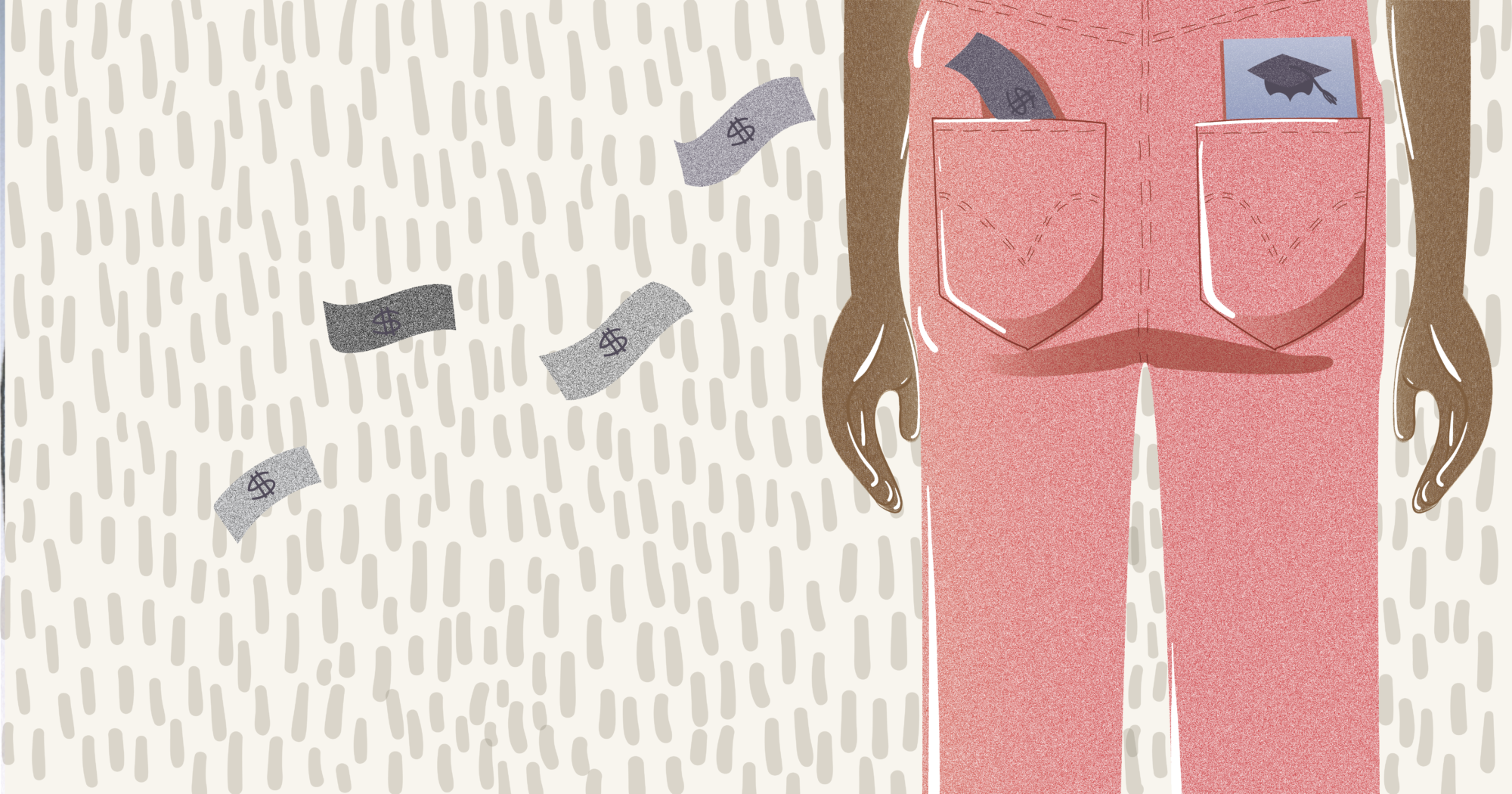In addition to being a full time senior at Lang, an anonymous global studies student works 20 hours a week as a dominatrix to cover her expenses.
“I’m not even paying debt off,” she said. “I’m paying rent.”
Besides just the expenses of being a college student, she has also accumulated around $23,000 in student debt. And that’s despite graduating in three years instead of four.
As of 2012, the student loan debt in this country surpassed its one trillion dollar mark, according to MarketWatch, a financial website owned by Dow Jones & Company. You can even watch this number rise second by second.
While experts disagree on the exact amount with which today’s seniors are graduating, according to Cappex, which helps students find scholarships, and The College Access and Success, a nonprofit organization, the numbers range somewhere between $30,100 and $37,172.
Why these numbers are so high is a matter of great debate, but one reason is the rising cost of college itself.
According to a report released on October 26th by the College Board—a private nonprofit organization that administers the SATs and AP tests—out-of-state tuition and fees at public institutions went up 3.6% to $24,930 in 2016, while at private non-profit institutions tuition and fees also rose 3.6% to $33,480 in 2016.
Though the increase in numbers may seem small, tuition and fees are rising at a faster rate than financial aid and family income, according to the report.
The average debt for a New School student who graduated in 2013 – the most recent year for which data is available – was $25,495, as reported by ProPublica in 2015 as part of its Debt by Degrees project. Since then the annual cost of the school has gone up $3,000.
For students facing these high debt levels, the costs are more than numbers on a spreadsheet.
The student working as a dominatrix, for example, will have so much student debt when she graduates that she may have to give up grad school for a couple of years until she can find a fellowship that will help pay for it.
This anonymous student wants to be a journalist or documentary filmmaker, but she’s aware these careers probably wouldn’t pay enough to service her student loans. If she’s unable to pay a substantial amount of debt before starting graduate school, she plans on keeping her job as a dominatrix until she could get a foot in the door as a foreign services officer for the United States Department of State – not her dream, but an option she feels is available to her as a global studies major.
“You’re usually stationed abroad and if you’re good at your job you can make your way into a career in diplomacy,” she said.
The student described her job as a dominatrix as a safety net. Through this job she makes $2,000 a month, which has helped her pay for rent, food, and transportation. It doesn’t, however, take away from her stress about paying off student loans.
“This isn’t my ideal job,” she said. “Some people go into it and they’re like actually into it. I’m not into it. It’s a good job. It pays well and I happen to be okay at it.”
Students who have graduated and have a nine-to-five job also feel the burden of their debt.
Stephanie Leone, 25, who graduated with a BA in Literature from Lang and a BFA from Parsons in Communication Design in 2015, took out a total of $46,000 in loans.
When asked how long she thought it would take her to pay of her loans, Leone simply replied “forever.” And in her current financial state, Leone can hardly afford to pay for her $116-monthly Metrocard.
Even with a stable job at The New School in the Department of Marketing and Communication, her expenses still cause mental and emotional strain. For example, this month she was stressing about paying her rent with all the other bills that were also due. The problem was exacerbated because it was her mother’s birthday, and the desire to get her a nice gift was tempered by concern over how to pay her Internet bill and buy paint supplies.
“So that left me with not so much for food, emergencies, and absolutely no chance of contributing to savings,” she said.
Leone struggles month to month finding affordable groceries without resorting to the same Trader Joe’s meal every day. Also, a recent illness left her with a few medical bills, some of which she still hasn’t been able to pay, and the cost of the medicine that she had to buy while out sick for a week.
Parents can be a great help for graduates struggling financially, but there are some times when even that falls short.
When Leone started at the New School, her family had a thriving family restaurant in the Neshaminy Mall outside Philadelphia. But after the economic crash of 2008 and rising costs, her parents had to close the restaurant. This meant they could no longer contribute significantly to Leone’s education, which meant she had to turn to student loans. Now, Leone feels guilty about the loans and the fact that they’re trying to help her pay them off.
“I feel guilty that my 73-year-old father who has been working for over 60 years is still having to help me shoulder the important burden of education,” Leone said.
The anonymous Lang student also worries about the effect of the debt on her parents. In other words, student debt has become a two-generation problem. “My mom’s $100,000 in debt from her master’s in education program [and] the interest accrued. She’s probably never paying off her student loans. She’s not worrying about mine. I have to worry about that.”
While many recent graduates experience debt as a burden, some experts actually say it’s not so bad in the long run.
“The jury is out about the effect of student debt on current graduated students,” said Teresa Ghilarducci, economics professor at The New School and an expert on retirement and financial security.
Darrick Hamilton, associate professor of economics and urban policy at the Milano school, pointed out that student debt hasn’t always been a negative thing, especially since students use their loans to receive a good education. “Historically it has been a type of debt that is not necessarily bad debt, because it gave people access to positions in managerial or professional occupations,” he said. The trouble now, Hamilton said, is that the sheer amount of debt means even a high-paying job may not undo the troubles caused by student loans.
A survey done by the National Center for Education Statistics shows that students who graduated with a bachelor’s degree in 2014 made about $49,900, while those without their college degree earned around $30,000.
Hamilton also suggested that there might actually be other benefits to sky-high student debt, namely that it’s might cause people to fight for change.
“Social movements are suggesting that younger people are not satisfied with this current status quo and want change,” he said. Already the Democratic Party has added college affordability, debt-free college, and student debt relief onto their platform.
“A good education is always worth its price tag,” Leone said.
Check the NSFP in the weeks to come for follow-up stories on the effects of student debt on African-American students.
Illo: Alex Gilbeaux
Odalis is a senior studying Journalism + Design at Lang and the social media manager of The New School Free Press. She spends time watching all of the TV shows and likes to yell about them to her friends, and occasionally writes about it. She is originally from Puerto Rico but calls Miami home (#Miss305) and is very passionate about Cuban food, empanadas, and the salsa dancing emoji.







